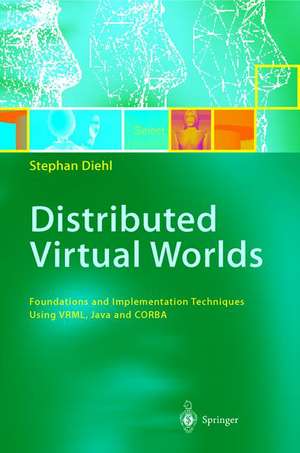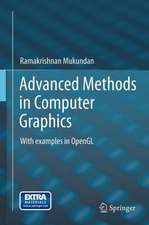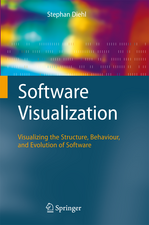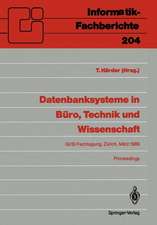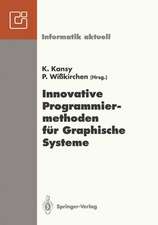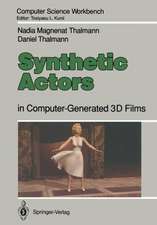Distributed Virtual Worlds: Foundations and Implementation Techniques Using VRML, Java, and CORBA
Autor Stephan Diehlen Limba Engleză Hardback – 13 feb 2001
| Toate formatele și edițiile | Preț | Express |
|---|---|---|
| Paperback (1) | 326.64 lei 6-8 săpt. | |
| Springer Berlin, Heidelberg – dec 2010 | 326.64 lei 6-8 săpt. | |
| Hardback (1) | 331.40 lei 6-8 săpt. | |
| Springer Berlin, Heidelberg – 13 feb 2001 | 331.40 lei 6-8 săpt. |
Preț: 331.40 lei
Preț vechi: 414.26 lei
-20% Nou
Puncte Express: 497
Preț estimativ în valută:
63.42€ • 68.87$ • 53.27£
63.42€ • 68.87$ • 53.27£
Carte tipărită la comandă
Livrare economică 22 aprilie-06 mai
Preluare comenzi: 021 569.72.76
Specificații
ISBN-13: 9783540676249
ISBN-10: 3540676244
Pagini: 186
Ilustrații: XII, 166 p.
Dimensiuni: 155 x 235 x 17 mm
Greutate: 0.39 kg
Ediția:2001
Editura: Springer Berlin, Heidelberg
Colecția Springer
Locul publicării:Berlin, Heidelberg, Germany
ISBN-10: 3540676244
Pagini: 186
Ilustrații: XII, 166 p.
Dimensiuni: 155 x 235 x 17 mm
Greutate: 0.39 kg
Ediția:2001
Editura: Springer Berlin, Heidelberg
Colecția Springer
Locul publicării:Berlin, Heidelberg, Germany
Public țintă
Professional/practitionerCuprins
1. Motivation.- 2. Technical Aspects.- 3. User Perspective.- 4. Three-Dimensional Computer Graphics.- 5. Virtual Reality Modeling Language (VRML).- 6. Protocols for Distributed Virtual Worlds.- 7. VRML Extensions for Distributed Virtual Worlds.- 8. Partitioning of Distributed Virtual Worlds.- 9. Streaming.- 10. 3D Technologies for the Internet.- 11. Implementing Multi-User Worlds with VRML.- 12. Java Network-Programming: A Simple Distributed Virtual World.- 13. Implementing Multi-User Worlds with CORBA.- 14. The Future.- List of Figures.- List of Tables.- References.
Textul de pe ultima copertă
Recently with the success of Java and the existence of different interfaces between VRML and Java, it became possible to implement three-dimensional Internet applications on standard VRML browsers (PlugIns) using Java. With the widespread use of VRML browsers, e.g., as part of the Netscape and Internet Explorer standard distributions, everyone connected to the Internet can directly enter a virtual world without installing a new kind of software. The VRML technology offers the basis for new forms of customer service such as interactive three-dimensional product configuration, spare part ordering, or customer training. Also, this technology can be used for CSCW in intranets.
The reader should be familiar with programming languages and computers and, in particular, should know Java or at least an object-oriented programming language. The book not only provides and explains source code, which can be used as a starting point for own implementations, but it also describes the fundamentalproblems and how currently known solutions work. It discusses a variety of different techniques and trade offs. Many illustrations help the reader to understand and memorize the underlying principles.
The reader should be familiar with programming languages and computers and, in particular, should know Java or at least an object-oriented programming language. The book not only provides and explains source code, which can be used as a starting point for own implementations, but it also describes the fundamentalproblems and how currently known solutions work. It discusses a variety of different techniques and trade offs. Many illustrations help the reader to understand and memorize the underlying principles.
Caracteristici
A hands-on approach to implementing Web 3D applications With a theoretical and a practical part A technically detailed overview of existing solutions for specific problems in this area With a Web site containing the source code (Java and VRML files) of the examples in the book, running servers, and links to public domain software
